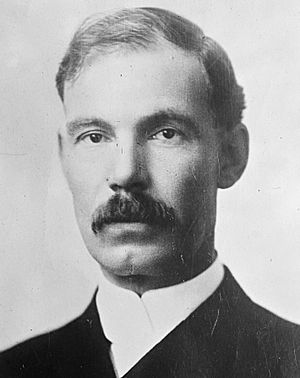Edward Alsworth Ross facts for kids
Quick facts for kids
Edward Alsworth Ross
|
|
|---|---|

From the George Grantham Bain Collection (Library of Congress)
|
|
| Born |
Edward Alsworth Ross
December 12, 1866 Virden, Illinois, US
|
| Died | July 22, 1951 (aged 84) |
| Known for |
|
| Scientific career | |
| Fields | Sociology |
| Doctoral advisor | Richard T. Ely |
| Doctoral students | C. Wright Mills |
Edward Alsworth Ross (born December 12, 1866 – died July 22, 1951) was an American sociologist and economist. He was an important person in the early study of criminology, which is the study of crime and criminals. He was also known for his progressive ideas.
Contents
Early Life and Education
Edward Alsworth Ross was born in Virden, Illinois. His father was a farmer. Edward went to Coe College and finished his studies there in 1887.
After teaching at a business school for two years, he traveled to Germany to study at the University of Berlin. He later returned to the U.S. and earned his PhD in political economy from Johns Hopkins University in 1891.
Ross taught at several universities. These included Indiana University (1891–1892), Cornell University (1892–1893), and Stanford University (1893–1900). He also taught at the University of Nebraska (1900-1904) and the University of Wisconsin-Madison (1905-1937).
He also studied economics. He looked at topics like taxes, managing debt, and understanding value.
Leaving Stanford University
Edward Ross left Stanford University after a disagreement. This event is often called Stanford's "first academic freedom controversy." It happened because of his strong opinions on immigration.
Ross believed that certain groups of immigrants should not be allowed into the U.S. He spoke publicly about wanting to limit people coming from China and Japan. This view was very different from the ideas of the Stanford family. The Stanfords had made their money from building railroads, which often hired immigrant workers.
Ross also made comments in his classes about the railroad industry. He once said, "A railroad deal is a railroad steal." This upset Jane Stanford, who was a leader at the university. She asked him to resign.
Many professors at Stanford resigned in protest after this event. This led to a big discussion across the country. People debated how much freedom professors should have to express their ideas. They also talked about how private groups controlled universities. The American Association of University Professors was created partly because of this incident.
Later Career and Views
After leaving Stanford, Ross taught at the University of Nebraska until 1905. In 1906, he moved to the University of Wisconsin–Madison. There, he became a professor of sociology and later led the department. He retired in 1937.
Ross had ideas about how immigrants became part of American society. He believed that America's identity was shaped by its "frontier" or wild lands. When the frontier was declared "closed" in 1890, he worried it would be harder for new immigrants to fit in.
After the Bolshevik Revolution in Russia in 1917, Ross visited the country. He supported the revolution, even though he knew it was violent. He later pushed for the U.S. to officially recognize the Soviet Union. However, he also served on a group called the Dewey Commission. This group found that Leon Trotsky was innocent of charges made against him by the Soviet government.
From 1900 to the 1920s, Ross supported the Prohibition movement, which banned alcohol. He also continued to support limiting immigration. However, by 1930, his views on these topics had changed.
In the 1930s, he supported the New Deal programs of President Franklin Roosevelt. These programs aimed to help the country recover from the Great Depression. In 1940, he became the chairman of the national committee for the American Civil Liberties Union. This group works to protect people's rights. He served there until 1950.
Edward Alsworth Ross passed away in 1951.
Selected Works
- Sin and Society: An Analysis of Latter-Day Iniquity (1907)
- Social Psychology: An Outline and Source Book (1908)
- The Changing Chinese: The Conflict of Oriental and Western Cultures in China (1911)
- What is America? (1919)
- The Russian Soviet Republic (1923)
- Seventy Years of It: An Autobiography (1936)
- New-Age Sociology (1940)
See also
- American Committee for the Defense of Leon Trotsky
 | Shirley Ann Jackson |
 | Garett Morgan |
 | J. Ernest Wilkins Jr. |
 | Elijah McCoy |

